#separate and unequal
Explore tagged Tumblr posts
Text
The draft is not an example of gender inequality because women are not as militarily useful as men and men are not as demographically necessary as women.
“To treat the unequal as equal is the greatest offense against equality.”—Friedrich Nietzsche
#zeroth law: unequal treatment is only unjust if the circumstances are the same#things that ain't so#i guess this is discourse#salty amateur anthropologist#also the fact you should ONLY use the draft in existential war not expeditionary is a completely separate question
8 notes
·
View notes
Text
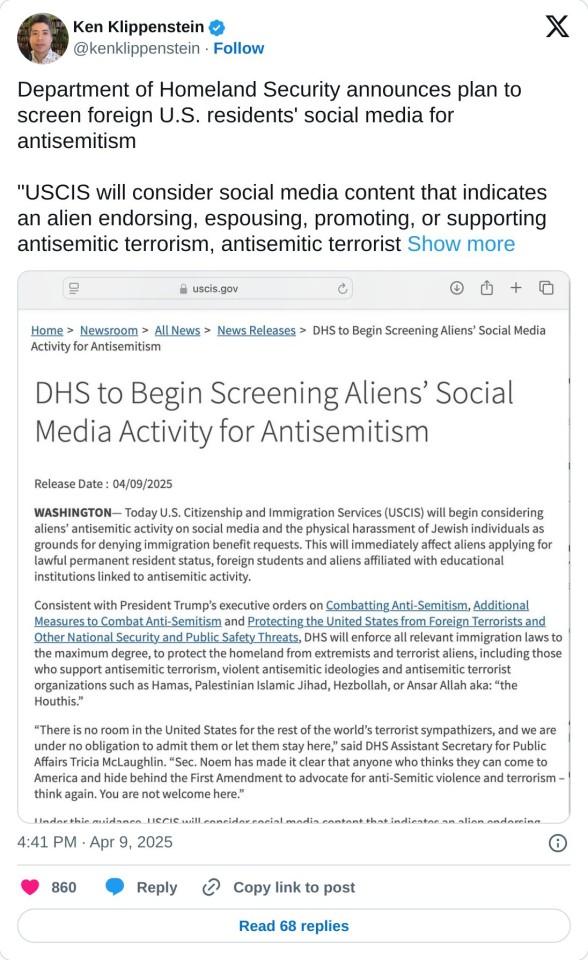
"Antisemitism" uh huh.
I hope even one "free speech" advocate who ranted about Facebook not promoting medical misinformation and twitter banning Nazis feels the hypocrisy for even one second.
Anyway. Citizens are next. We're on the other side of the Rubicon now.
#us politics#to be clear its a crime when it happens to noncitizens too#i cant get over how extreme they are going with an immigration system that was ALREADY massively unfair#you know? there was already a conpletely separate and unequal justice system for immigrants in this country#'not good enough make it even worse' they said
11 notes
·
View notes
Note
You can’t just vaguely mention KhaoMix and then leave it at that! Circus must circus!
Oh I will circus. The funniest thing about the Khaotung and Mix becoming sisterwivs situation....


....is that I called it three years ago. An excerpt from my boner fic:
Khaotung just looks…so very fuckable. Surely, any person with an ounce of sexual libido will be immediately consumed by the raging desire to wreck him till he’s crying with desire, till they’ve consumed the marrow in the hollows of his bones before lovingly and carefully putting him back together. First is having a very normal human reaction to the most beautiful creature that has graced the mortal world. ‘You look like Mix vomited on you.’ First blurts out because his brain refuses to have a single appropriate thought and it was the first thing that came to his mind that wasn’t some variation of ‘please let me suck your dick’. He knows immediately that he’s fucked up when Khaotung’s satisfied smirk falls. His hands shoot up to grip unsurely at the three clip-on rings on the shell of his ear- ‘He gave me this shirt. It looks stupid, right? I told him that I won’t be able to pull it off.’
I have no idea why 3 years ago I thought if Khaotung were to dig into his core for an ounce of genuine femininity he'll find it in Mix and uh??? okay??? I guess what works works lmao 🤣
I've been noticing for a while that Khaotung looks more and more like Mix, very similar to his Ray days but...less Ray and well, more the way I actually imagined him in the boner fic - acting like Mix in order to seduce First but of course that is - uh - fic...like that is delululand.
But this event was A Lot on the sisterwives-ing front:

anyhow the gangbang enthusiast in me loves that in the dark Earth won't be able to tell Mix and Khaotung apart (yes this is an earth is old joke. we are the exact same age so I can make it)
But the true clown to circus ascent is the prediction of the future. Let's do some math shall we?
Mix == Khaotung
Therefore,
EarthMix == EarthKhaotung AND FirstKhaotung == FirstMix
Hence, does it hold that:
Earth == First?
I am putting forth important points of discourse that could change the course of history (why have static branded pairs when the option to dress up barbie them literally exists?) photocred from the wonderful @scrumptiousstuffs
#nani answers#every morning I wake up#and I am cursed with having thoughts#emfk polycule#firstkhao#earthmix#listen I just about escaped mentioning the unequal bottoms separation between these two pairs#so like lets leave this sister wives situation right here#fk delulu circus
12 notes
·
View notes
Text
S1E1

Q: What makes this episode so fuckin good?
Well, kind of everything.
As any good narrative should, this episode sets up (even if briefly) a normal, apple pie life, and then disrupts that normalcy in a big way. There’s this sense of dramatic irony as the viewer catches on to the foreboding feeling the show is doling out (flickering lights, the MUSIC, etc) and the characters remain unaware until it’s too late. Then, the best moment of the introductory scene, “Take your brother outside as fast as you can.” I really feel like this sets up the entire premise of the show, a thematic motif if you will, wherein Dean is his brother’s keeper (KIN).
The next segment of the episode sort of repeats the disruption of normalcy, settling the viewer into Sam’s life at school while creating this intrigue by setting him up as the estranged golden child. Then we get Dean’s introduction (which is the best fucking character intro possibly ever), aka the disruption of normalcy. I could talk about this for literally ever, but for now I wanna focus on one thing in particular: the dialogue. The writer's are presented with these complex characters and history and have like one scene to start revealing the important shit that sets up the rest of the episode, and they do that via clever, efficient dialogue between Sam and Dean. Most everything they say to one another either reveals plot or characterization, and does so in a way that feels really natural. My personal favorite thing about the dialogue is how it sets up this recurring theme of the struggle between wanting a normal, 'apple pie' life, and being unable to have it (and each brother's feelings on the subject, which makes me crazy). The dialogue for the rest of the episode is equally good at revealing who each of the brothers are, and how they were raised.
Now I'm gonna fast forward to the end of the episode, not because the rest of the episode isn't great (it's really great), but because the way the episode ends is a big part of what makes it stand out so much to me. Jess's death is the perfect example of a character death being necessary to move the plot forward. The show would not proceed the same way at all without her death happening when it does and the way it does, and the way it brings the episode full circle is just... as a writer I could actually piss my pants thinking about it.
In my opinion, while the middle bits of the episode are really good, its truly the beginning and end that make the episode such a stand out. It's the perfect introduction to the series, laying out enough information to let you know what's going on while still keeping a few cards close to the chest to keep you intrigued. I've already watched the whole series more than once, and every time I come back to this episode it's just really, really fucking good.
#i would love to hear other people's thoughts on the episode!#i'm gonna make a separate post on things i noticed about the boys and consequent headcanons and such#apologies ahead of time for the extremely unequal distribution of thoughts#sorry sammy...#the winchesters#supernatural#dean winchester#sam winchester#mary winchester#spn#castiel#john winchester#s1e1#evie talks
29 notes
·
View notes
Text
'Good-bye, good-bye,' she repeated, her fingers fluttering on the table like a pianist's while her eyes told him how little he had ever meant to her.
L.P. Hartley, from The Harness Room
#unrequited love#unequal affections#farewell#goodbye#separation#you mean nothing to me#callous#description#quotes#lit#words#excerpts#quote#literature#l.p. hartley#the harness room
22 notes
·
View notes
Note
I'm super interested in seeing the results of the deltarune ending poll. It's been something I've been wanting to see Tumblrs opinion on. SPECIFICALLY because a different website with 24/7 deltarune discussion (4chan) seems 100% convinced the ending could not possibly be anything but the most maximum tragedy. Darkworld destroyed, multiple main character deaths, Rudy and Dess deaths ect ect. the whole works. I'm interested in seeing normal fans idea on how sad/happy the ending is likely to be.
Well, now that it's closed, let's see!

The main thing this tells me is that there isn't a strong consensus, at least here on tumblr. The three most negative options (time loop, all darkness banished, world ends) being the least voted for certainly contrasts with what you've said about the 4chan fandom, but it makes sense. People tend not to find such negative endings satisfying.
And, similarly, it makes sense that the option which basically keeps the status quo (darkners are confined to dw but lightners can visit) was barely voted for more than those. If the story is just going to return to the status quo by the end - especially one that keeps things unequal between lightners and darkners - what was the point?
I think the world being remade winning the poll is probably just because of my specific circle of mutuals / dr fans, lol. Among people who go harder on the "dark worlds are metaphors for fiction" angle, I figure that option would be less popular. Something about the importance of not eroding the barrier between fiction and reality to the point of confusing one for the other.
If you'd like to see more opinions on this, I'd recommend checking the notes of the original poll; here's the link :)
#deltarune#thanks anon!#i also get why the 2nd and 3rd most voted options (discounting the 'show results' option) got voted for as much as they did#if i really *wanted* to i would perhaps joke that the 'lw and dw are separate but visits can go both ways' option#is the kind of compromise that seems to please everyone on the surface but in reality just further entrenches an unequal status quo#you know. if i wanted to.#meanwhile separating the dark world from the light world would be tragic for the friends made across both worlds#but it's the kind of tragic i could see toby going for. unlike some. other theories
3 notes
·
View notes
Video
youtube
Brown v. Board of Education explained
#youtube#FYI education equity history BrownvBoardofEducation 70 years later. Separate educational facilities are inherently unequal. @HarvardUnivers
1 note
·
View note
Text

"Oh relax. I'm sure your big royal chicken ain't gonna let anything happen to his peppy lil' fuck doll." You already know the drill, rambles under the cut 😌
As much as I want them to eventually find out about it, I'm glad Blitz didn't know about Stolas' involvement in resolving the kidnapping situation in Oops. With the level of denial he was in, Blitz absolutely would've found a way to spin it into something negative. This art originally started off as an observation on how hard Blitz is projecting his own feelings about his relationship with Stolas onto Fizz's relationship with Oz. That if Blitz had known, the above line probably would've summed up what he'd think of Stolas' actions. The more I worked on it though, the more I realized it kinda went the other way as well, with Fizz doing a bit of his own denial and projection. Fizz wasn't wrong about Blitz missing the mark on Stolas' feelings, but his viewpoint has always struck me as having a bit of the rose-colored tint of exceptionalism, Fizz believing he earns his treatment (good or bad) via performance and separate from being an imp. That if he's good enough being an imp (and disabled) doesn't matter.
(spoiler: you can't succeed your way out of systemic inequality, sorry) Fizz and Blitz (pre-Mastermind) are both in relationships with unequal power dynamics and while I wouldn't consider Fizz and Oz's relationship unhealthy*, there's a sense of push-back against the inequality that isn't present for them but is for Blitz and Stolas. Despite their rocky start, Blitz and Stolas clearly see any inequality between them as something to resolve or address, whereas Fizz and Oz seem more resigned to it (or content to ignore it). Blitz is wrong about Stolas, but his dissatisfaction with their relationship isn't wrong - and Fizz could stand to learn a bit from that. So this piece ended up being more of a two-way conversation than I initially thought (and this post ended up being a lot longer than I planned 😂) *obviously it has room for improvement, but it's imperfect in ways that are realistic and non-worrisome. Even if I'm hoping for a bit of conflict between them going into season 3, I have absolute faith their relationship is solid and would make it out intact. Anyways, have this fun and relevant screenshot:

#anyways first time I drew fizz! yay!#helluva boss#helluva boss fanart#blitzø#fizzarolli#my art#I had this sitting in my drafts for so long#I was worried I wouldn't like the art by the time I posted it but I still like it 😊
391 notes
·
View notes
Text

Relationship Green flags/ Red flags
This list was a part of another post but I want to make a separated one for it, to serve as a reminder, for myself, and for anyone who needs it. I will update the list if I think of anything more to add.
Green flags
When the couple is also best friends with each other
When they're genuinely curious about each other
When two people walk side by side, not one in front and one behind
They protect each other in front of other people no matter how wrong the other person is (not counting abuse or other legal crimes), but still be able to see the wrong doings clearly.
When both partners put the other's well-being at the top of their priority list
When the first person comes to your mind when you want to share something good or bad is them
When there's a spark in the eyes when they look at the other person
Listen attentively when the other is talking
Ask how you feel
When both can feel comfortable being honest (able to voice their concerns, worries, fears, hidden dreams, aspirations etc.)
Encourage and support each other towards betterment
Celebrate each other's happiness
Keeping their words
Willingness in solving problems
When both are willing to compromise and work together/to face the ugly sides of the relationship or of the self and the other person/ to communicate/ to learn
When both are proactive in the relationship, taking turn to suggest fun things to do, where to go, what to eat etc
All kinds of virtues like honesty, patience, kindness, loyalty, respect, etc. (not just towards you only, but to others in general also)
Love children
Love animal
Consistency: putting in a consistent effort, not being wishy-washy
Fun & humour
Feeling safe in each other's presence
Respect for boundaries and consent
Emotional compatibility
The feeling of being at ease with each other & trust (you can have all the above but without these two feelings, it's kind of meaningless)
and many more.
Red flags
When one is talking and the other is looking elsewhere
When one is in front while the other is behind
Being judgmental and opinionated, about all kinds of topics
Criticising the other person's taste, hobbies, habits constantly. Especially in front of other people.
Calling names (not the cute endearments)
Cruelty & Violence of any kind (obviously)
Silent treatment (refusing to communicate)
Inconsistency
Being avoidant, ghosting (at this point it's not a red flag, it's an ending)
Empty promises. NATO (No Action - Talk Only)
Condescending
Tell you what you're feeling
Unwillingness to compromise/ to understand, unequal effort, one-sided conversations
Lack of care for the well-being of the other person
Lack of appreciation for the other person's achievements and success
When you're low on their priority list ("I will have time for you after I'm done with this or that, after I met with my friends and other important people in my life")
Feeling like you have to tip toe around the other person
Feeling like you have to do something to get the other's attention
Asking the other person for permission to do something like buying something, meeting someone, going somewhere (I'm not talking about getting consent to do something with each other or getting something related to the other person, it's about decisions that normally one can make independently for oneself)
Jealousy & possessiveness (the idea can seem attractive on paper but the reality is usually not)
Demanding to know every secret, every password, getting access to every personal space of the other person
Lack of respect for boundaries and consent
Passivity (waiting for the other to initiate, never initiate anything)
"Why are you doing this to me?", victim mindset, constant blaming
Dating someone while thinking that person is not attractive or up to one's level or vice versa, thinking that person is way above one's level (the idea of "level" is damaging, both ways of thinking can bring illusions, unrealistic expectations and power imbalance)
Lack a healthy sense of self
and many more.
182 notes
·
View notes
Text
President Donald Trump is still angling for Canada, home to one of the world's largest economies and boasting a land mass slightly exceeding that of the United States, to become the 51st state − this time offering the northern neighbor inclusion in an ambitious air defense system. Trump dangled the proverbial carrot in a May 27 post on his social media platform Truth Social, writing that they could either pay billions to join his proposed "Golden Dome" missile defense system, or get it for free, if they give up their sovereignty. "I told Canada, which very much wants to be part of our fabulous Golden Dome System, that it will cost $61 Billion Dollars if they remain a separate, but unequal, Nation, but will cost ZERO DOLLARS if they become our cherished 51st State," Trump said in the post.
As I understand it missile defense pretty much needs Canada's cooperation, need radars looking north because north is where missiles from Russia are likely to come from. Ordinarily it wouldn't be a problem, now though it could be harder.
75 notes
·
View notes
Text
The fandom god discussion is interesting, but I feel it’s sometimes hindered by an unwillingness to separate gods from mortal society, or even a sort of over-eagerness to project our own reality onto them, which simply doesn’t work. I've seen the gods referred to as rulers or tyrants demanding worship (which I kinda understand because it’s something Ludinus says in-game, though it’s funny to see fandom corners confidently repeat the inaccurate talking points of the antagonist) but more interestingly I've also seen them referred to as a higher/the highest social class, as colonizers imposing themselves on mortals, the raven queen specifically as new money. Overall these comparisons tend to talk about the gods and their actions regarding Aeor in the past and predathos/the Vanguard in the present less as if they're about saving their own lives and more as if they want to preserve their powerful position.
The gods, by their very nature, are above mortals. They cannot be compared to any mortal ruling class because they didn’t choose or strive for that power and cannot feasibly get rid of it/step down/redistribute it (nor do they actually in any sense rule; killing the raven queen, unlike killing an actual queen, will not end the 'tyranny' of death), they simply have it by virtue of being gods. Saying that’s unfair or unequal and that the gods should be killed because of it is akin to saying it’s unfair a mountain is bigger than you and demanding it be levelled, except the gods, unlike mountains, are living, feeling beings who shouldn’t have to die because some people can’t stand the idea of not always being top dog. Thing is, the gods themselves ultimately understood this power imballance and that they can't help but hurt Exandria the way humans can't help but step on bugs, and thus removed themselves from the equation by creating the divine gate. Saying this isn’t enough and that they're clinging to power is just demanding they line themselves up to be killed.
#critical role#cr3#downfall#nella talks cr#ultimately all these 'ruling class' comparisons are simply flawed and don’t work when under the slightest bit of scrutiny#gods arent rulers or tyrants bc they don’t rule and can't be deposed#they are representantations and guardians of (mostly natural) concepts#and those concepts won’t go away bc you killed the gods. death and nature and the fucking sun will still remain#they aren’t colonizers of mortals (wtf lmao) who demand they be worshiped and mortals live according to their oppressive rule#again did you watch calamity? not even before the divine gate did the gods demand worship or even respect#they were never less respected than during the age of arcanum and still they were just chilling#(until someone released the betrayers and they had to step in to stop the ultimate destruction of exandria)#technically you could argue they were colonizers against the titans but even that feels like a stretch#the titans to me feel less like people and more like representations of the chaotic and deathly side of nature#being angry they were killed sounds like being angry someone stopped a hurricane just bc the hurricane was there first#I'm sorry but that hurricane would've flattened you. it wouldn’t appreciate your support bc it isn't a person#and 'a higher social class' fucking NEW MONEY? this is just blatant projection#I'm sorry but not everything more powerful than you is a stand in for oppression#sometimes it’s a narrative stand in for nature and i promise nature isn't oppressing you
394 notes
·
View notes
Text
Lokius vs Sylki season 2 episode 2 (cinematography wise)

Green background (in this show I’ve analyzed it’s usually used as a color for enchantment)
Bodies overlap from our angle
Completely facing each other
Nothing blocking them from each other
Equal playing field (both eating pie)

Orange/yellow tones (I’ve analyzed this color is usually used for lying and betrayal)
Bodies separated
Not entirely facing each other (though they do later)
BIG ASS CASH REGISTER AS A BARRIER BETWEEN THEM
Unequal playing field (employee vs customer)
#if you don’t know#I think that sylki was briefly canon to show Loki how to not hate himself#because sylvie betrayed him in a way#when now he has grown to learn trust and be trustworthy#they have learned they have very different morals now#loki#loki season two#loki x mobius#lokius#loki mobius#loki spoilers#loki season 2#if you want proof of my analysis for what these colors mean in this series I will be happy I give it tomorrow after I get rest
891 notes
·
View notes
Text
What's so interesting to me about Dipper is that he has no friends!
Okay, that's not necessarily true. dipper gets along very well with Soos, for example, and he's the twins' primary big brother figure for most of the show (we love u, soos!) dipper also grows very close to wendy, and in the end chooses to treasure their friendship more than he does any romantic feelings for her. he isn't lacking in terms of having important people in his life

but there's no one his age !
the closest we see to dipper having any sort of friend group is when he hangs out with wendy and his friends, which is obviously very telling of the fact that he wants to grow up, and he wants to grow up fast. consequently, he doesn't really want to be friends with them, per se, as much as he wants to impress them and prove that he's more than just a kid
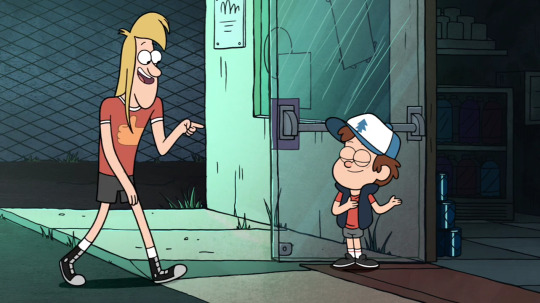
(this is also contigent with his feelings for wendy, thematically speaking, but that's a conversation for another day)
along this train of thought is the fact that wendy's friends don't see him as a friend, either, simply because they are unequals out of age difference alone. this doesn't mean that they dislike him, in fact they're glad to have him around, but dipper's an accesory and not an actual member of the group, which is not necessarily a bad thing, simply that it's different
in general, the only person dipper interacts with in more or less an equal level is mabel, except her case is very different!

from her countless love interests, we see she has a very easy time interacting with people as early as tourist trapped, she is not shy ! she is not insecure ! she flirts, she giggles, she parties, you go mabel !
the most important element to this, i think, would be how in contrast to dipper, mabel manages to make a little friend group who share common interests and have similar personalities (candy and grenda)
this is not because dipper is somehow weirder and mabel the socially charming one. in fact, mabel doesn't enjoy a particularly popular reputation, and is thought of by pacifica as silly and childish during irrational treasure
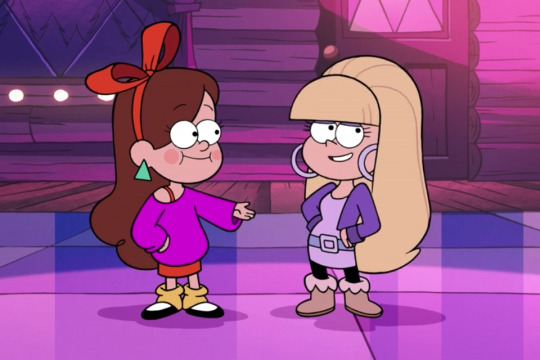
from the very beginning, we see mabel and pacifica clash in a classic "weird vs mean" dynamic, with pacifica being someone who enjoys a favourable status in gravity falls (a little bit like a celebrity) and continuously antagonizes mabel, who hangs out with candy and grenda, consistently portrayed as weird and unpopular since their introduction during double dipper
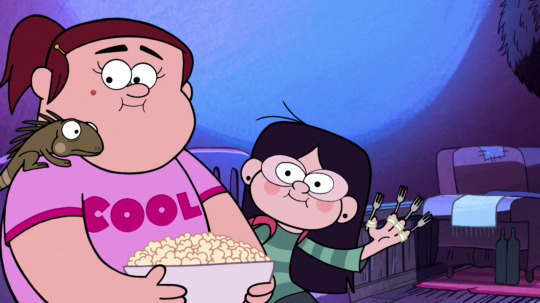
regardless, mabel has no trouble making friends. she isn't a popular girl, but she is a social girl
you'd think that mabel, who has the wider support network, would be less dependant on dipper than dipper is on her
that's definitely the case in the valentine's day flashback shown in weirdmaggedon part 2, where mabel has a considerable amount of valentines, while dipper gets none and is mocked to the point of physically having to run out of class. he even hides his birthmark all the time because the kids made fun of him for it !

so it's very interesting that when we see the twins face the idea of permanent separation, it's mabel who doesn't want to leave dipper, not the other way around !

ps; pleeeeease send me asks about gravity falls i want to talk about this show so badly
#gravity falls#gravity falls meta#kindaaa#i hope i made myself clear#spent a while writing this...#i didnt know if i should add the pics but i did in the end so it's not just a big block of text#idk if i should have LMFAO but whatever whats done is done#dipper pines#mabel pines#long post#just in case
77 notes
·
View notes
Text
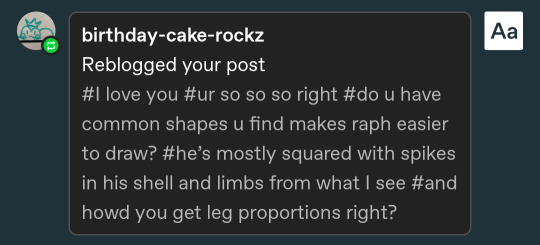
Hi @birthday-cake-rockz! I hope its okay if I answer your questions here in a separate post. I definitely have some tips and thoughts for help with drawing Raph.
First of all, I recommend This free PDF of the book "Morpho - Fat and Skin Folds: Anatomy for Artist" for those who are interested in really getting familiar & comfortable with drawing larger/fat/thick body types. (Make sure you click the second link, the first one is broken)
Now for Raph specifically, I do have a one very important shape I use when I draw him that might be helpful:
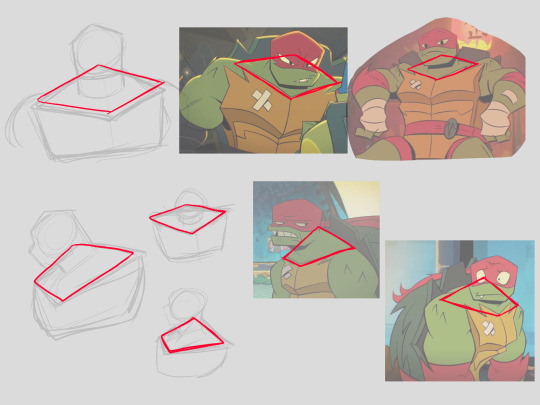
A lot of people like to associate diamonds with Raph as much as squares, and I think that's accurate to his design, too! The boy has a lot of serious neck muscle going on, and so his trapezius muscles and those surround it are gonna be more visible. Which actually creates a diamond shape around his collarbone and upper body. If you follow along with the angles of his shell, you can create this shape to help give him that stronger upper body look!
As for his leg proportions, that's a bit tricky because unlike his brothers, Raph's lower limbs are disproportionate to his upper limbs. It's a case of "you have to understand the rules of anatomy in order to break them".
SO!! Real quick anatomy lesson that I learned in art school: the average adult body should be about 7 heads high. Because the boys are teenagers, theirs come up to be about 6 heads high, which I credit to their younger age. But as you can see by the red marked areas, everything is still in normal proportion.

Raph, on the other hand, is different.
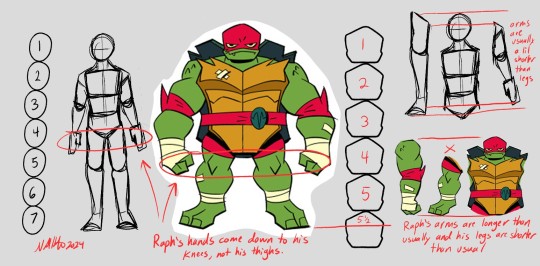
Raph's arms are as long as his body is, and his legs are much shorter than his arms. Because of this, he's actually disproportionate to his brothers, since his height is only about 5 and a half heads tall, rather than 6 or 7. In particular, his thighs seem to be unequally shorter in length than the calves. I think its important to keep that in mind when draw him! Because even if you know he's made up of all these thick, blocky shapes, if you try to give him the normal proportions you would Leo or Donnie or Mikey, it might still not look right. He's a stocky lad, and his upper body strength is showcased by these design choices.
Hope all this was helpful for you guys. Now go be free and draw him to your hearts content! :)
Additionally, here are several other links to posts people have created that give references of Raph and the other turtles! I'm sure these will be a big help, too.
High Quality Reference Sheets of everyone, including April and Splinter
Turtle Side Profiles Specifically
Multi-Angle Ref Sheets
RAPH'S SHELL
MASTERPOSTS by @melancholic-rowen: RAPH | LEO | DONNIE | MIKEY | APRIL | CASEY | CASEY JUNIOR
#rise of the teenage mutant ninja turtles#rottmnt raph#rottmnt raphael#rise of the tmnt#rottmnt#rottmnt analysis#rottmnt art#rottmnt reference#anatomy help#tmnt raph#asks#art tutorial
491 notes
·
View notes
Note
Hiii can I request a fluff scenario in which Kayden Break who, when asked what his sexual orientation is, simply responds "my woman". I read that somewhere and I forgot lol. Thanksssssss

Sometimes Kartein wondered what Kayden's sexuality was. Well, considering that he only fights, no one knew anything about his personal life. So he decided to ask and satisfy his curiosity.
- Listen, Kayden, what is your orientation? - Kartein did not lead the conversation around the bush, he took it and asked directly. Jiwoo was not at home anyway, so they could open up.
- My woman, - Kayden answered without hesitation while he was training his control of his powers, only after a couple of seconds it dawned on him that Kartein had asked, - Why did you even ask that?
- Do you have a girlfriend? - Kartein was already in shock. He didn’t believe that such a crazy person like Kayden had a girlfriend.
- Well, we're almost married. And yet, what was the question before? - Kayden clearly couldn’t understand what the question was about.
Kartein completely fell out of reality; he didn’t expect that this crazy man was almost married, and he himself was single.
Why he is “almost” married is a separate question. Because Kayden promised you that he would marry you as soon as he defeated someone from the TOP 10, and here he is wounded after an unequal fight with three from the ranking at once. It turned out ugly, but this is his goal at the moment, because he wants to marry you, the one to whom he entrusted his life.
- Who, anyway, is she? Human or awakened? - Kartein asked, recovering from shock.
- (Y/N) from the TOP 50 world ranking.
Kartein's shock could not be described in words. He knew you as a strong awakened one, but for you to be a girlfriend, almost a wife, Kayden Break was too much for him. Many men tried to get your attention, but out of all the men, you chose Kayden. Kartein doesn’t even want to ask how you met, this will already be a fierce combo-shock in a day.
228 notes
·
View notes
Text
The bill states that when it comes to transgender people, “The term ‘equal’ does not mean ‘same’ or ‘identical’,” which raises the question: what does “equal” even mean? The bill does not define the word, only declares that “equal” no longer means “same” or “identical” within the state of Iowa for transgender people. When the sponsor was asked directly what the word “equal” means in this bill, the representative Heather Hora answered: “Equal would mean … um … I would assume that equal would mean … I don’t know exactly in this context.”
[...]
The bill’s sponsor is not content with redefining the word equal, however; the bill goes on to proclaim that “separate” is “not inherently unequal”. One opponent to the bill pointed to the cruel history of the doctrine of “separate but equal” and the attempt to revive that history with a new, Republican-condoned target. Though the new definition of the word “equal” and the revival of the “separate but equal” doctrine only applies to transgender people, the precedents that make up the bedrock of equality for all are threatened. Is it so important for Republicans to get a political victory against transgender people in the state that they are willing to go this far?
another important article from Erin Reed, which not only highlights the current anti-trans movement in Iowa but also points out how current anti-trans legislation could put even more marginalized groups at risk
323 notes
·
View notes